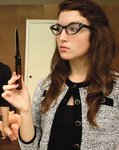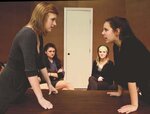


Shane Stewart made an inspired choice. Knowing he didn’t want 12 actual angry women on his hands this year, he looked around carefully and cast his senior students as theatrical “12 Angry Women.”
“We have an abundance of talented females in our program,” the Talented Theater teacher said,” and I wanted to reward them for their hard work before they head off to college, but also challenge them as they approach the next step of their training.”
The practicality of providing strong roles for 12 powerful female actors may have led Stewart to consider the classic play, but it has a lot more going for it as well.
The title should sound somewhat familiar, because, as Stewart points out, back in the 50s, before “Law and Order,” “Boston Legal,” or “LA Law,” even before “Perry Mason” or “To Kill a Mockingbird,” there was “12 Angry Men,” a Westinghouse Studio One teleplay by Reginald Rose that he rewrote for the stage and then for the screen.
The movie version pitted the likes of Lee J. Cobb, E.G. Marshal, Martin Balsam, Ed Begley and Jack Klugman as nearly unanimous jurors pitted against a hold-out played by soft-spoken everyman Henry Fonda in a courtroom drama so riveting that it garnered nominations for every film award given at the time including three Oscars. It won many of them, although losing many others to the more spectacular “Bridge on the River Kwai.”
Fans of courtroom dramas are invited to join the Livingston Parish Talented Theatre Department for a presentation of that historic drama, Dec. 13, 14, 15, and 16 at North Live Oak Elementary in Watson.
First telecast live in 1954, the story by Reginald Rose begins after a murder trial. It follows the jury as they decide the guilt or innocence of the young Hispanic man accused of the crime. If they find him guilty, they are condemning him to death. If the find reasonable doubt, he goes free. Either decision must be unanimous.
“12 Angry Men” returned to television in 1997 and debuted on Broadway in 2004. Fifty years after it was created, the Roundabout Theatre production won the 2005 Tony for Best Revival of a Play.
The LPTT production directed by Shane Stewart features the typical nameless jury; characters are identified only as Juror No. 1, Juror No. 2, and so on. But instead of 12 men, they are played by 12 women.
“I did not personally adapt the play. It has been performed with women many times,” Stewart said. “Often it is performed with men, as the classic title suggest, but it can also be performed with a mixed cast of both men and women.”
This cast consists of 12 high school girls from Live Oak High and Walker High. From Walker High are Madison Rushing, Joni Bankston, Lauren Buchanan, Miranda Bordelon, Kassidy Ortego, Cassidy Smith, Samantha Lichtenstein, Megan Robertson, and Madeline Miley. The Live Oak students are Brielle Pourciau, Haley Miller, and Britney Kelley. Landon Hazel of Walker High appears as the Bailiff and the lone male in the play.
Stewart himself is the off stage voice of the judge. His assistant director is Ali Bueche.
Since Stewart joined the Talented Theatre teaching corps eight years ago, they have produced 14 theatrical works. “12 Angry Women” stands out as the only modern drama among works with more accessible stories and less complex characters, such as “Dracula” and “Snow White.”
“This particular play has allowed the students to expand their horizons by approaching a new acting style and experiencing other aspects of theatre outside comedy and romances,” Stewart said. “It has been one of the more challenging experiences for both myself and my actors. This is the longest we have rehearsed a play, in attempts to get every little nuance just right.
“Many people think comedy is harder than serious drama because of all the timing involved,” Stewart said. “Strangely I think their extensive background in comedic acting has lent itself to these roles. While they are not telling jokes or ‘slipping on banana peels,’ they use the same techniques to create these roles as they would for a comedy. Remember, the character in a comedy doesn’t necessarily think they look ridiculous, they believe they look great. I told the girls that no matter what role you play, play it seriously. Trust the writer to create the situations that will cause either dramatic tension, or comedic affect.”
The action of “12 Angry Women” takes place entirely in the jury room, and the actors never change costume. Holding the audience interest depends entirely on the dialogue between the jurors, who are not even named.
The original play cast only men, as the title suggests, but they were men with distinctive physicality, age, class, and temperament and dressed accordingly. In the hands of experienced actors, the jurors quickly distinguished themselves, one from another. With a cast of young women, all of the same age and similar builds, with even their hair of similar length, keeping their characters distinctive was a challenge.
Asked if they managed that challenge, Stewart answered, “Absolutely. The writing lends itself to specific characterization, and the actresses utilized everything they have learned to created believable and differentiated roles. They are able to express attitudes toward things, social standing, financial standing, mood, and relationships in this play. Each character has a different background and situation and the girls do a great job of expressing this to the audience.”
Commenting on the actors’ physical similarities, he continued, “In the beginning they had some issues but as the rehearsal process advanced, they really came into their own and found their separate identities. For some it was as simple as a costume or hair choice, for others it was a walk or a way of holding themselves, and still for others it was the character’s accent or inflection. They all grasped onto some aspect of the character and made it their own.”
The play will be performed at North Live Oak Elementary at 36605 Outback Road in Watson. The opening performance on Dec. 13 will begin at 6:30 p.m. Performances on Dec. 14 and 15 begin at 7:30 p.m. The matinee on Sunday, Dec. 16, begins at 4:30 p.m.
Admission is $8 for adults and $6 for students.